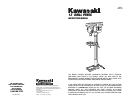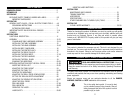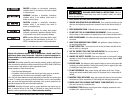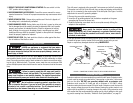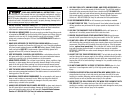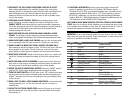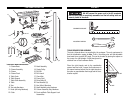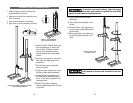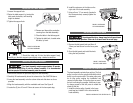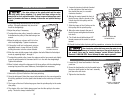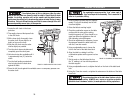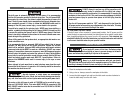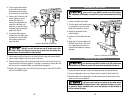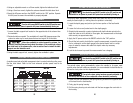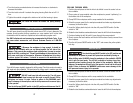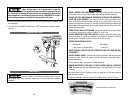
30.ADDITIONAL INFORMATION about the proper use of bench-mounted drill
presses is available from the Power Tool Institute, 1300 Sumner Avenue,
Cleveland, OH 44115-2851 (www.powertoolinstitute.com). Information is also
available from the National Safety Council, 1121 Spring Lake Drive, Itasca, IL
60143-3201. Additionally, you can refer to the American National Standards
Institute (ANSI) 01.1 Safety Requirements for Woodworking Machines and the
U.S. Department of Labor OSHA 1910.213 Regulations.
USE COMMON SENSE WHEN OPERATING THIS DRILL PRESS OR OTHER POWER
TOOLS. Never try to perform drilling operations on work pieces that are too large
to be clamped to the worktable or vises. Keep this manual and refer to it often to
ensure proper operation and prevent unnecessary accidents or injuries.
SYMBOLS
IMPORTANT: Some of the following symbols may be used on your tool. Please
study them and learn their meaning. Proper interpretation of these symbols will
allow you to operate the tool better and safer.
SYMBOL NAME EXPLANATION
V Volts Voltage (Potential)
A Amperes Current
Hz Hertz Frequency (Cycles per Second)
W Watt Power
Kg Kilograms Weight
Alternating Current Type of Current
Direct Current Type of Current
Alternating or Direct Current Type of Current
Earthing Terminal Grounding Terminal
Class II Construction Denotes Double Insulation
min Minutes Time
s Seconds Time
Diameter Size of Drill Bits,
Grinding Wheels, etc.
No load speed No-load Rotational Speed
.../min Revolutions per Minute Revolutions, Surface Speed,
Strokes, etc. per Minute
1,2,3, … Ring Selector Settings Speed, Torque or Position Settings
10
19.DISCONNECT THE DRILL PRESS POWER CORD FROM THE AC OUTLET
before making adjustments to the worktable, clamps, vises, work pieces,
changing drill bits, or changing the speed of the drill motor preventing the tool
from accidentally turning on. Failure to adhere to this step could result in
damage to both the work piece and the drill press as well as possible severe
injury to the operator.
20.THOROUGHLY CLEAN THE DRILL PRESS before changing types of work
pieces. Combining wood and metal dust can result in an explosion or fire.
CONSULT EXPERT advice before drilling in work pieces made of magnesium.
The friction generated by the drill bit could the magnesium to ignite resulting in
a very intense fire that could cause severe burns to the operator and/or
seriously damage the drill press.
21.NEVER PERFORM DRILLING OPERATIONS NEAR FLAMMABLE GAS OR
LIQUIDS. The resulting fire and/or explosion could cause permanent serious
injuries to the operator and damage to the drill press and surrounding work area.
22.ALWAYS KEEP ARMS, HANDS, AND FINGERS away from the work piece while
it is on the table and the drill press is turned on. Severe injury could result.
23.ALWAYS CLAMP THE WORK PIECE FIRMLY AGAINST THE WORK TABLE.
Never attempt to hold the workpiece by hand. The drill bit can seize in the work
piece causing it to spin rapidly. This will cause loss of control of the work
piece resulting in severe injuries or damage to the work piece and drill press.
24.NEVER APPLY A COOLANT directly to the work piece while it is in contact with
the drill bit. Coolant can weaken the makeup of the drill bits causing them to
fail.
25.NEVER PERFORM LAYOUT OR ASSEMBLY to work pieces in front of the drill
press while it is still running. A sudden slip could bring hands in contact with
the moving parts of the drill press resulting in injury to the operator.
26.REDUCE THE RISK OF UNINTENTIONAL STARTING. Ensure the “ON/OFF” switch is
set to the “OFF” position before plugging the power cord into the AC outlet.
27.TURN THE ON/OFF SWITCH on the drill press to the “OFF” position and unplug
the power cord from the electrical receptacle when the drilling operations are
finished. Thoroughly clean the area surrounding the drill press making it ready
for the next use.
28.NEVER LEAVE THE DRILL PRESS RUNNING UNATTENDED. when finished with
a drilling operation, turn “off” the drill press and wait until it comes to a
complete stop.
29.SECURE THE ELECTRICAL POWER CORD when the drill press is not in use to
prevent unauthorized use of the tool and/or to prevent children from acciden-
tally turning it on.



